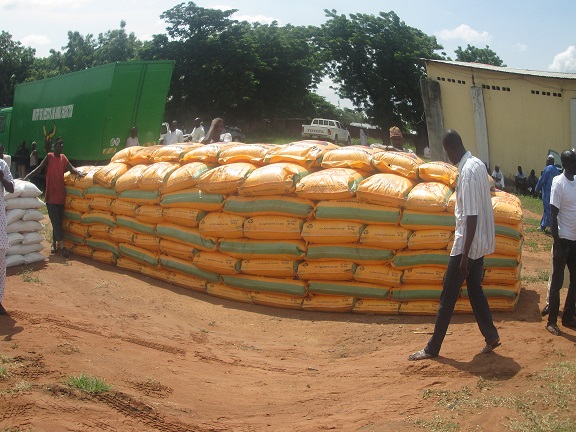 The European Union said it is providing 138,000 bags of high quality fertilizer to more than 23,000 households in Adamawa and Kebbi States. It is a special intervention project, designed as a strategic cost-recovery mechanism, targeting 2,000 villages across 70 rural communities.
The European Union said it is providing 138,000 bags of high quality fertilizer to more than 23,000 households in Adamawa and Kebbi States. It is a special intervention project, designed as a strategic cost-recovery mechanism, targeting 2,000 villages across 70 rural communities.
Owolabi Adenusi reports that it’s the third annual review of the European Union’s food security support to Adamawa and Kebbi States. With its target of reaching 35,000 vulnerable rural households already surpassed, the union is taking stock of the project which will close next year.
The project that has so far expended close to eleven million Euros in three years.
OXFAM believes its partnership with government to provide critical assistance for vulnerable rural communities has to an extent succeeded in improving their livelihoods and making them food-secure.
It also believes it has been able to build up resilience in smallholder farmers and in four local government areas in Adamawa State and three Local Government areas in Kebbi.
Elder statesman and renown farmer, Ahmed Joda, said government has the structure to boost the development of agriculture. Some of the stakeholders and beneficiaries share their views on the intervention of the European Union.
“Before now we use to farm without fertilizer but now things have changed because they made fertilizer available to us. Before I used to get about
five bags on my farm but now I get twenty to twenty five bags on the same portion of land.
They also brought animals to increase our income which has improved our lives. So we are very grateful to them.”
Residents of Adamawa state are now advocating the continuation of the programme as a means of reducing poverty.
The strategic intervention of the European Union in agriculture has recorded successes in recent years with the building of 350 community-
managed food reserves, transfer of improved breed of livestock as well as the transformation of beneficiaries to donors.
Others include the development of rural finance through village savings and loans associations in 70 rural communities and creating inputs revolving
schemes through the delivery of 138,000 bags of quality fertilizers to more than 23,000 households.
Most of OXfam’s successes in this project has come from reviving extension services which has resulted in a phenomenal increase in agricultural yield




